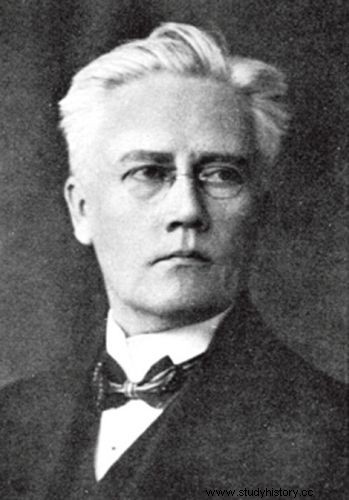We associate Sweden as an open and happy country. It turns out, however, that it is not an oasis of peace and security for everyone. In Sweden, refugee centers are on fire, and the far-right is playing an increasing political role. How did it come about?
Wiktoria Michałkiewicz decided to fight the stereotype of Sweden as a country of openness and security. In his debut reportage, he deals with the history and the present of this country. He is looking for the reasons for the growing popularity of the far-right, and he conducts talks with contemporary Swedish nationalists. And he warns that under favorable circumstances, it really doesn't take much to free hatred.
A long history of research into the "purity of race"
The beginning of research on breed superiority in Sweden dates back to the turn of the 19th and 20th centuries. Anders Retzius and his son Gustaf, whose bust is still in the Karolinska Institutet, are considered to be the precursors of this type of research.
They initiated the method of comparing the skulls of representatives of different nations and they owned an enormous collection of human remains from almost all over the world. Among them were the skulls of the indigenous peoples of Australia with "skulls of medium size, narrow, long, rather short", who, according to the researchers, were "at the lowest level of development in the category of spirituality, far behind the Hottentots, the Kafrican and the Negroid races." / P>

Book A country not for everyone. About Swedish nationalism just appeared on the market under the patronage of Historical Curiosities
Gustaf promoted in science the father's research method - the so-called Retzius index. The later rector of the Karolinska Institute emphasized that "thanks to her, various forms of skulls could be so easily compared". Few objections to the reliability of the method have been ignored. Retzius was committed to researching the Nordic race.
Herman Lundborg, a novice physician, was fascinated by Retzius' work. It was he who contributed to the establishment of the Institute of Breed Purity in Sweden, and his lectures will be attended by people such as Hans Günther, who later became one of the most important breed researchers in Nazi Germany .
Heinrich Himmler also maintained a lively correspondence with the doctor, at a time when the SS troops were just being formed in Germany. He liked the views of Lundborg, who believed in the strength of the Germanic race and spoke of others:
Under no circumstances can a favorable environment improve the quality of a people who are essentially worthless or racially unhelpful, such as Gypsies or Negroes. It is likewise possible to improve the quality of the lowest fallen strata in cultural societies to a similar extent, for example, individuals who routinely break accepted norms, vagabonds, imbeciles and the mediocre.
Sweden and World War II
Contrary to popular opinion, it is difficult to say that Sweden remained neutral during World War II. The authorities showed clear pro-Nazi sympathies, and the German politics and military successes were admired.

Herman Lundborg
In Wiktoria Michałkiewicz's reportage, we can learn about the accounts of Jewish survivors of Polish origin who ended up in Sweden after the war. The public was basically deaf to their suffering. While there were war dramas taking place in Poland, there was concern in Sweden about coffee supplies. The Swedish press was neutral about the subsequent restrictions in occupied Poland.
The situation changed, of course, when the Germans started losing the war, but before that it is hard not to notice clear sympathies.
Book - warning
Wiktoria Michałkiewicz's debut is a book - a warning. By analyzing the past, the author shows analogies in the contemporary world. It presents the career of the Swedish Democrats party, recalls the opinions of contemporary nationalists and explains how the situation in which refugee centers for refugees are burning there happened today.
I am glad that the report is under the patronage of Historical Curiosities, because I think it is one of the most important books of this year. It allows you to look at Sweden in a new way, broadens our historical knowledge and reminds that history likes to repeat itself.
This is a book that each of us should read. Because one should draw conclusions from history.

Book A country not for everyone. About Swedish nationalism just appeared on the market under the patronage of Historical Curiosities
